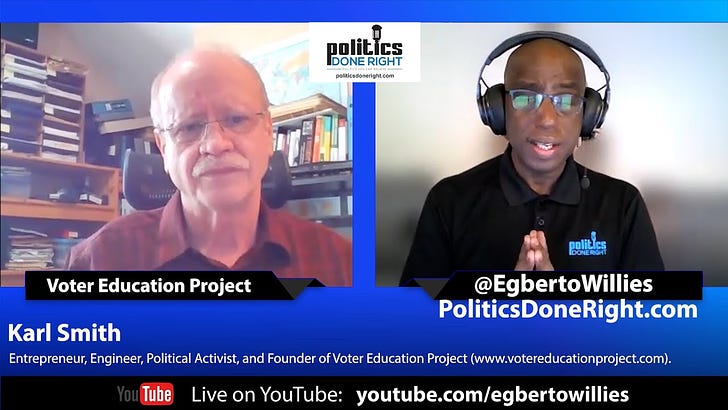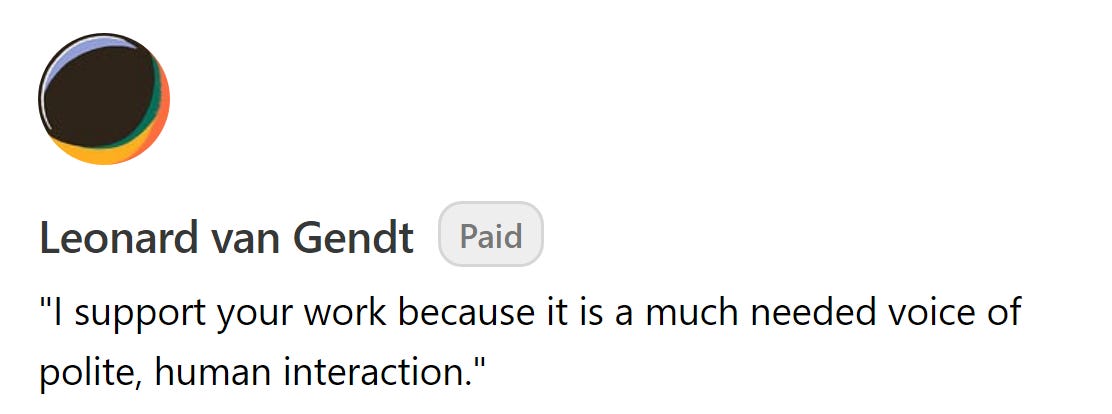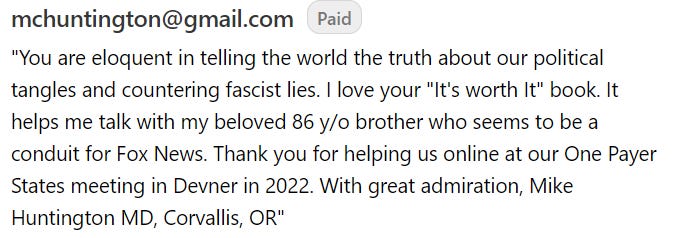Karl Smith discusses political realities every voter must know MAGA, inflation, economy, & more
Entrepreneur, Activist, Engineer, and Founder of the Voter Education Project, Karl Smith, discusses the critical economic, political, and social issues every voter must hear and share.
NOTE: We need 300 new paid subscriptions to meet October’s goal! Please make a difference.
We are grateful for our Paid Subscribers and Free Subscribers. In this political climate, we need several hundred more Paid Subscribers. Misinformation funded by the deep pockets of our Oligarchy floods the internet. We are using all our platforms on-air, online, and in publications to counter that. We ask that you invest the equivalent of less than a coffee to ensure we can keep doing this effectively. Please invest in a Democracy that serves all of us by becoming a paid subscriber. It comes with many benefits.
Karl Smith discusses political realities.
Summary
In a recent Politics and Right interview, Karl Smith, political activist and founder of VoterEducationProject.com, sheds light on critical economic and social issues shaping American lives today. He addresses the roots of inflation, the real meaning behind “Make America Great Again,” and the importance of fair public investments, urging Americans to question divisive rhetoric and consider policies that foster inclusivity and sustainable economic growth.
Inflation Reality: Smith argues that inflation is a global issue exacerbated by the pandemic and corporate price gouging, not due to current U.S. policies.
Systemic Inequality: Policies that block wage increases and deny child tax credits hurt working families, benefiting the wealthy, a long-term conservative strategy.
MAGA vs. Inclusivity: The MAGA slogan alienates historically marginalized groups, whereas policies promoting equal opportunity can truly make America great for everyone.
Misconceptions about Socialism: Democratic policies focus on sustainable capitalism rather than socialism, promoting fair wages and public investments without eliminating private enterprise.
Protecting Freedoms: True freedom, according to Smith, is defending everyone’s rights, including groups with differing views, as demonstrated by figures like Liz Cheney and organizations like the ACLU.
Smith’s discussion highlights the importance of policies that uplift working families and small businesses, creating a fair economy accessible to all. Investing in education, healthcare, and fair wages, the nation can build a sustainable future where prosperity is broadly shared, countering divisive rhetoric and prioritizing inclusivity over fear-based politics.
In a recent discussion on Politics and Right, Karl Smith, a political activist, engineer, and creator of VoterEducationPro.com, shared insights on a range of crucial issues from the economic forces impacting inflation to the implications of “Make America Great Again” and the systemic roots of inequality. Smith emphasizes a grounded perspective on economic realities, shedding light on crucial topics that affect Americans’ daily lives while challenging prevailing misconceptions about economic performance, systemic inequality, and political influence.
The Real Causes Behind Inflation
Smith’s analysis of inflation is both a clarification and a correction to the political blame game that often targets the current administration. He emphasizes that inflation is a global phenomenon exacerbated by the pandemic destabilizing economies worldwide. While many Republicans have framed rising prices as a failure of President Biden’s economic policies, Smith explains that inflation would have plagued any administration due to the pandemic’s unprecedented disruption of supply and demand chains. Additionally, Smith points to corporate price gouging as a factor ignored mainly in conservative narratives. Price manipulation has increased costs, particularly in essential sectors, impacting everyday consumers while inflating corporate profits.
Comparing the U.S. economic recovery to other advanced economies, Smith notes that Biden’s legislative measures, like the American Rescue Plan, have significantly aided recovery. Although inflation rates were high, the U.S. economy has rebounded faster than most, thanks to policies designed to support workers and businesses. However, the system’s structural flaws remain apparent, especially for lower-income families.
Systemic Inequality and Policy Failures
Smith argues that economic inequality and worker struggle are entrenched issues rooted in policies that have, over decades, undermined workers’ economic security. While the wealthiest Americans and corporations thrive, many workers live paycheck to paycheck. This disparity reflects systemic issues, such as Congress’s failure to raise the federal minimum wage, which remains below the livable standard. Smith highlights the Republican resistance to policies like the child tax credit extension and wage increases, which he argues would significantly benefit working-class families and stabilize the economy. Such measures, blocked primarily by Republican lawmakers, reflect long-term conservative priorities that benefit the wealthy at the expense of working-class Americans.
Smith underscores that essential policies, like the child tax credit, would not only alleviate economic hardship for millions but also inject economic vitality across local communities. Inadequate wages and insufficient social supports, he argues, erode families’ economic resilience, forcing them to make difficult financial decisions that could be avoided through fair policies.
The Rhetoric of “Make America Great Again” vs. Reality
Smith addresses the slogan “Make America Great Again,” pointing out that it harkens back to a period when many Americans—especially women, minorities, and LGBTQ+ individuals—lacked fundamental rights. The era that MAGA proponents idealize excluded these groups from social and economic equality, making the slogan both misleading and offensive to those who value inclusivity. Smith contrasts this perspective with what he describes as the Democratic ethos of making America great for everyone, ensuring everyone has equal opportunities, representation, and security.
In contrast to the exclusivity implied by MAGA, Smith contends that Democrats advocate for policies that create inclusive prosperity and address systemic inequality. Policies supporting racial and gender equality, workers’ rights, and environmental protections form a comprehensive vision that includes rather than excludes marginalized communities.
Misconceptions about “Democratic Socialism” and Economic Policy
Smith tackles the frequently misunderstood concept of “democratic socialism,” a term that the political right often uses to stoke fear and misunderstandings. He clarifies that what Democrats advocate is not socialism in the sense of abolishing private enterprise or individual ownership but sustainable capitalism—a model in which the government plays a role in ensuring that prosperity is shared broadly rather than concentrated among the elite.
In nations often labeled “socialist” by the right, private enterprise thrives, and markets function robustly within a system where workers’ rights and public welfare are prioritized. According to Smith, this approach enables capitalism to be a force for broad-based prosperity, creating a society where education, healthcare, and infrastructure investments benefit everyone. Smith argues that this type of government intervention creates a more resilient economy and prepares a healthier, better-educated workforce capable of driving growth.
Asking the Right Questions: What Makes a Thriving Society?
For Smith, voters must reflect on questions beyond partisanship: “What does it take for people to thrive?” and “What does it take for businesses to thrive?” According to Smith, the answers to these questions reveal the necessity of investing in public infrastructure, valuing workers with fair wages, and ensuring a fair system that provides opportunities for everyone. He suggests this is at the heart of the Democratic approach, even if Democrats sometimes struggle to communicate it effectively.
Smith explains that thriving communities and businesses are interdependent—when people have good jobs and economic security, they become valuable business customers, which strengthens the economy. Investments in healthcare, education, safe communities, and infrastructure are foundational, benefiting individuals and the companies that rely on them.
The Republican Strategy: Lies and Fear Tactics
In his discussion, Smith calls out the Republican tendency to use misinformation to mischaracterize Democratic policies. He references misleading claims about issues like immigration, abortion, and “socialism,” which the right weaponizes to sow division and distract voters from real issues. For example, Republicans portray Democrats as advocates for unrestricted immigration and abortion, even though the reality is more nuanced, and the motivations are often to support people’s rights and choices.
On immigration, Republicans have often characterized migrants as criminals, which not only perpetuates harmful stereotypes but distracts from a broken immigration system. Smith also points out the GOP’s fear-based rhetoric on abortion, casting Democrats as radical advocates for late-term abortions. This portrayal is simply inaccurate and ignores the individual and medical complexities of abortion issues.
Protecting Freedom by Advocating for Everyone’s Rights
Smith concludes by touching on the concept of freedom, noting that a society truly values freedom when it defends all rights, including those who live or believe differently. He compares this commitment to the ACLU’s work, which often supports individuals or groups with unpopular views to safeguard civil liberties. He highlights figures like Liz Cheney, who, despite significant ideological differences, has defended democratic principles in the face of partisan pressures. This broad view of freedom is about advocating for one’s beliefs and supporting the societal structures that protect individual rights and freedoms for all.
Conclusion: Building an Inclusive America
In today’s polarized environment, Karl Smith’s insights offer a reminder that America’s challenges are best met with solutions rooted in fairness, inclusivity, and truth. Economic recovery, systemic reform, and a commitment to democracy require policies that benefit all citizens, not just the wealthiest few. As Smith argues, by asking the right questions and resisting divisive rhetoric, voters can make informed choices that will lead to a truly great America—an America that upholds freedom, fairness, and opportunity for everyone.
Viewers are encouraged to subscribe and join the conversation for more insightful commentary and to support progressive messages. Together, we can populate the internet with progressive messages that represent the true aspirations of most Americans.
Can we count on your help to reach our goal of 300 needed new paid subscriptions by the end of the month?
The other side has big donors and everyday citizens who invest heavily in platforms that lie and misinform. All we have is you. So, please invest in our media outlet by clicking the subscribe button below to become a paid subscriber. You won’t miss that coffee, but it will make a difference in our politics as we spread the truth about our policies and progressive politics. All paid subscribers get to read my five books on this platform and all subsequent books I write. They will also be privy to subsequent incentives.









Thanks for spotlighting Karl Smith's Voter Education Project, and your careful summary. I mostly agree with Smith's progressive views, but wish he'd place more emphasis on universal healthcare, aka Medicare for All (M4A).
Smith talks about "freedom." Here's an M4A perspective: https://medium.com/@idember/9-freedoms-of-healthcare-justice-5077bdbff9f2 .
I like his mentioning the interdependence of community and business. Again, there's a public policy connection with M4A. See https://businessfreedom1.weebly.com and https://medium.com/@idember/universal-healthcare-boon-to-business-owners-3ff561951da1 .
That said, I am disappointed that Smith's website reprised the tired old GOP-vs-Dems framing. Better to frame it strictly as extreme wealth vs ordinary folks, regardless of party labels. (For a better model, see billionaire Nick Hanauer's progressive "pitchfork economics" framing, https://PitchforkEconomics.com and https://www.politico.com/magazine/story/2014/06/the-pitchforks-are-coming-for-us-plutocrats-108014 .)
Regarding M4A in particular, Dems have done us no favors. The Affordable Care Act has marginally benefited many people but has needlessly shoveled trillions of dollars into corporate bank accounts — exacerbating inequality while perpetuating medical bankruptcies and draining the US Treasury, among other ills.